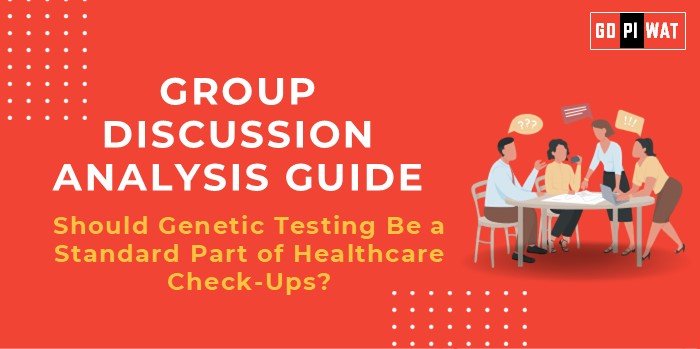📋 Group Discussion (GD) Analysis Guide: Should Genetic Testing Be a Standard Part of Healthcare Check-Ups?
🌟 Introduction to Genetic Testing in Healthcare
- Opening Context: “Genetic testing is revolutionizing personalized medicine, offering insights into individual health risks and guiding prevention strategies.”
- Topic Background: Originating from advancements in genomics, genetic testing allows early detection of diseases and tailored treatments. Its application in routine healthcare promises to bridge the gap between prevention and treatment but raises ethical, financial, and social concerns.
📊 Quick Facts and Key Statistics
- 🌍 Global Genetic Testing Market: Valued at $14 billion in 2023, expected to grow at a CAGR of 10% by 2030 (source: Global Market Insights).
- 👶 Prevalence of Genetic Disorders: Affects 3–5% of newborns globally.
- 💰 Cost Reduction: Whole genome sequencing costs have dropped from $3 billion in 2003 to under $1,000 in 2023.
- ⚕️ Preventable Cancers: 10% of cancers are linked to hereditary factors detectable via genetic testing.
🔗 Stakeholders and Their Roles
- 🏛️ Government and Healthcare Systems: Policymaking, funding, and integrating genetic testing into public health.
- 🏥 Medical Professionals: Educating patients and ensuring ethical testing and usage.
- 💻 Genomic Companies: Advancing technology and ensuring affordability.
- 👥 Patients: Decision-making and ethical concerns.
- 💳 Insurance Providers: Structuring coverage plans for genetic testing services.
🏆 Achievements and Challenges
✨ Achievements:
- ✅ Early Disease Detection: Reduces healthcare costs and improves survival rates (e.g., BRCA gene testing for breast cancer).
- 🎯 Personalized Medicine: Enhances treatment outcomes.
- 💡 Technological Advancements: Improved accuracy and affordability of tests.
⚠️ Challenges:
- 🔒 Ethical Concerns: Genetic discrimination and privacy issues.
- 💵 Affordability: High upfront costs deter widespread adoption.
- 📚 Knowledge Gap: Lack of awareness among medical practitioners and the public.
Global Comparisons:
- 🇮🇸 Success in Iceland: Comprehensive genomic databases improved healthcare outcomes.
- 🇮🇳 Challenges in India: Limited accessibility and affordability hinder widespread use.
Case Study:
- 🧬 23andMe Initiative: Provided affordable testing, raising awareness about genetic health.
💡 Structured Arguments for Discussion
- Supporting Stance:
“Genetic testing should be standard as it facilitates early diagnosis and reduces long-term healthcare costs.” - Opposing Stance:
“The risks of genetic discrimination and unequal access outweigh its benefits at present.” - Balanced Perspective:
“Genetic testing holds transformative potential but requires ethical safeguards and equitable access.”
🎯 Effective Discussion Approaches
- Opening Approaches:
- 📊 Statistical Impact: “With over 10% of cancers linked to hereditary factors, genetic testing can save thousands of lives annually.”
- 🔍 Contrast: “While genetic testing offers life-saving benefits, the fear of genetic misuse looms large.”
- 📖 Case Study: “The success of Iceland’s genetic database offers a model, yet affordability remains a global challenge.”
- Counter-Argument Handling:
- 🔒 Acknowledge concerns, such as privacy, and propose solutions like stringent laws.
- 💵 Emphasize progress in reducing costs and improving testing accuracy.
📈 Strategic Analysis of Strengths and Weaknesses
- 💪 Strengths: Early diagnosis, personalized care, cost reduction in long-term healthcare.
- 🛑 Weaknesses: Ethical concerns, knowledge gaps.
- 🌟 Opportunities: Expansion of testing programs, AI integration.
- ⚡ Threats: Misuse of genetic data, regulatory challenges.
🎓 Connecting with B-School Applications
- 📌 Real-World Applications: Linking healthcare costs, ethical dilemmas, and market potential to healthcare management.
- 🧐 Sample Interview Questions:
- 💬 “What are the economic implications of integrating genetic testing into standard healthcare?”
- ⚖️ “How can ethical concerns in genetic testing be addressed?”
- 💡 Insights for B-School Students:
- Focus on the role of technology in healthcare.
- Explore opportunities for policy-making or entrepreneurship in genomics.


